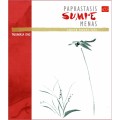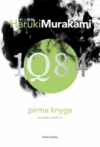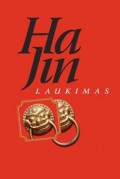 Authors:
Authors:
Takumasa Ono
Translated by:
Tilindytė, Lina
Translated from:
English
Published on:
2012
Born in Tokyo in 1959 Takumasa Ono is a full time artist. Who has travelled to various regions of Japan and in support of enviromental protection activities, painted the nature of Japan, that he hopes will be left untouched. He also vigorously works to introduce traditional Japanese culture to foreign countries.
Author‘s book is a very detailed introduction to the japanese traditional brush painting – More
 Authors:
Authors:
Ajahn Brahm
Translated by:
Bytautė, Inga
Translated from:
English
Published on:
2012
This book is a collection of tutorial stories. They teaches the importance of motivation, self confidence, looking for happiness and determination. They teach you, what to do if a burden of your problems seems too big, if envy obscures eyes, if it seems like life doesn’t entertain you anymore. This book shows you all the answers, you just have to let them teach you. The writer often remembers his teacher Ajahn Chah from the north-east, which was also teaching by telling stories, most of them Ajahn Brahm remembers, and shares in his book. Hi wrote this book inspired by his fan, this woman suffered from severe depression and Ajahn Brahm stories saved her from a suicide, this event encouraged him to release this book.
More
 Translated by:
Translated by:
Kugevičiūtė, Dagija
Translated from:
Japanese
Published on:
2012
„Five-Coloured Deer: Japanese Folk Tales“ – a set of 35 Japanese tales, translated by Dagija Kugevičiūtė in 2012. She was still a student at the University of Newcastle, UK, at the time. It is often said that folk tales is a great way to spark the interest in the culture of a certain country, especially if the said country is as exotic as Japan.
The characters if these tales perfectly demonstrate the importance of honesty and hard work, while those greedy, lazy or More
 Authors:
Authors:
Jayadeva
Translated by:
Jaskūnas, Valdas
Translated from:
Sanskrit
Published on:
(Lietuvių) 2012
Sorry, this entry is only available in Lithuanian.
 Authors:
Authors:
Murakami, Haruki
Translated by:
Susnytė, Ieva
Translated from:
Japanese
Published on:
2011
The events of 1Q84 take place in Tokyo during a fictionalized 1984, with the first volume set between April and June, the second between July and September, and the third between October and December.
The narrative is composed of three storylines based on the three main characters of the book, Aomame and Tengo are introduced in the first book. More
 Authors:
Authors:
Ha Jin
Translated by:
Daukšienė, Ona
Translated from:
English
Published on:
2011
‘Waiting’ – is a love story, which runs through the main character’s – doctor’s Lin Kong‘s life. He married the uneducated, customary, with damaged feet woman Shuyu, so that “it is simply impossible for her to leave her birth place”. Doctor Lin Kong works at a military hospital in Moody city and forbids his wife to visit him at work. His intentions are to meet her only once a year, when he gets twelve days of vacation and goes back to the village. Shuyu is humble wife, who does not complain with her man about his indifference, patiently looks after the farm and raises their daughter Hua. More
 Authors:
Authors:
Gao Xingjian
Translated by:
Biliūnaitė, Agnė
Translated from:
Chinese
Published on:
2011
The Novel is about journey in Lingshan (Soul Mountain) of which storyteller heard from a person who he met on a train. The journey is written inconsistently; inserting descriptions of nature or place images, folk festivals, faiths, legends and customs. The most parts of novel begin with real events or images, but later they are deviated from the main topic. We can also find subtle mentions about the mood of the narrator, inserting his thoughts. For this reason, it seems like the storyteller moves away from mountain and comes back again. More
 Authors:
Authors:
Pai Kit Fai
Translated by:
Jakutienė, Dalė Virginija
Translated from:
English
Published on:
2011
When the young concubine of an old farmer in southern China gives birth to a daughter called Li-Xia, or “Beautiful One,” the child seems destined to become a concubine herself. Li refuses to submit to her fate, outwitting her father’s orders to bind her feet. At the age of eight she is sold to the silk weavers at Ten Willows, where she faces a life of degradation — but Li manages to escape that too, and finds a way to continue the studies that mattered so much to her lost mother. An English sea captain, Benjamin Jean-Paul Devereaux rescues her by buying her freedom and safe passage on his ship, and she is able to fulfill her dream of literacy. They marry, defying societal norms, but in Hong Kong, Li is assaulted by an enemy of her husband, and fearing for her newborn girl, Siu-Sing, she has the child taken to safety in the mountains. More
 Authors:
Authors:
Hong Ying
Translated by:
Vaskelaitė, Ramunė
Translated from:
English
Published on:
2011
“The Concubine of Shanghai“ is a historical fiction where emphasis is put on life of East Asian woman and Chinese politics. The story brings the reader through a bright picture of the main character, competition between members, distress and intrigues. Ying book is internationally accepted, though in China it would probably be forbidden. The author combines her own opinion into the storyline and makes it more readable. Nowadays we can find many books about Asian women, which become prostitutes by violence, but this book is not like that at all. Here Chinawoman has showy charisma, wisdom and is able to break the rules of the eighteenth century therefore to achieve more than any other woman. “The Concubine of Shanghai“ involves many critical themes, one of them is women rights in the nation. More
 Authors:
Authors:
Sundaresan, Indu
Translated by:
Žalytė, Danguolė
Translated from:
English
Published on:
2011
Mehr un Nissa, a daughter of emperor Akbar’s courtier, fell in love with forthcoming heir to the emperor’s throne – prince Salym , when she was just a child. The girl cherished her dreams about him for many years, until they finally met. From that moment they started to live in each other’s thoughts. However, they did not meant to be together. They lived in a culture, where obedience and loyalty could not be ignored. Mehr un Nissa, of an edict of emperor Akbar, married Ali Quli, a man who served in the army.
Shortly after the marriage, emperor Akbar died and Salym inherited the throne and received a new name – Jahangir. However, even when he fulfilled his biggest dream to become an emperor of Mughal, he could not forget Mehr un Nissa. A girl, who was burdened by unhappy marriage and inability to have children, had only one bright thing in her life – memories of prince Salym and thoughts about what her life would be if she became Jahangir’s wife and empress. More
 Authors:
Takumasa Ono
Authors:
Takumasa Ono 
 Authors:
Ajahn Brahm
Authors:
Ajahn Brahm  Translated by:
Kugevičiūtė, Dagija
Translated by:
Kugevičiūtė, Dagija  Authors:
Jayadeva
Authors:
Jayadeva  Authors:
Murakami, Haruki
Authors:
Murakami, Haruki  Authors:
Ha Jin
Authors:
Ha Jin  Authors:
Gao Xingjian
Authors:
Gao Xingjian  Authors:
Pai Kit Fai
Authors:
Pai Kit Fai  Authors:
Hong Ying
Authors:
Hong Ying  Authors:
Sundaresan, Indu
Authors:
Sundaresan, Indu